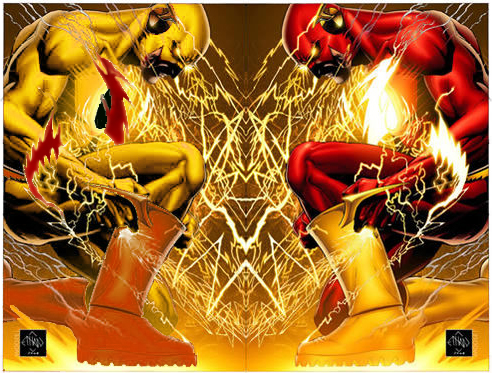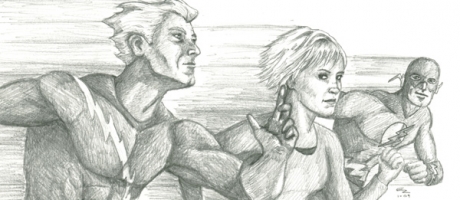This week, The Flash: Emergency Stop hits the shelves. The trade paperback covers half of the year-long Grant Morrison/Mark Millar run from the late 1990s, and, according to solicitations, features the conclusion of “Three of a Kind.” This three-part crossover between Green Lantern, Green Arrow, and The Flash features the second– and third-generation heroes Kyle Rayner, Connor Hawke, and Wally West. Villains Heat Wave, Sonar, and Hatchet attack a cruise liner in which Dr. Polaris is being secretly transported, only to find the three heroes have booked a vacation on the same ship.*
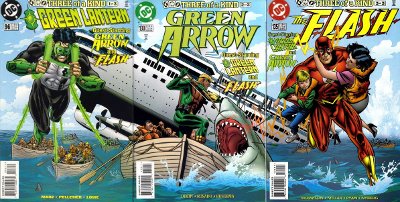
The segment in The Flash v.2 #135 focuses on the villains’ trial, with flashbacks to the incident. At the time, Wally West’s identity was public knowledge, though he testified in full costume. This in itself is unusual given standard courtroom dress codes (a skin-tight bright red costume isn’t exactly conservative business attire, and tends to stand out a bit). But then Green Lantern takes the witness stand:
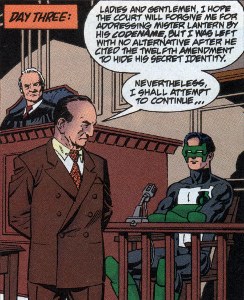
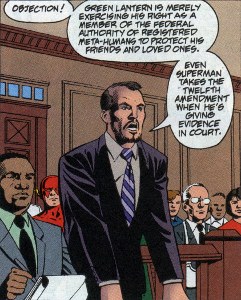
The usage is similar to the U.S. Constitution’s 5th Amendment, which states in part that “No person…shall be compelled in any criminal case to be a witness against himself.” Two things can be gathered from these panels:
- The DC Universe had a “Federal Authority of Registered Meta-Humans” years before Marvel’s Civil War (though after the first story with the Mutant Registration Act).
- The DCU version of the United States Constitution has a Twelfth Amendment which, under some circumstances, allows witnesses to give an alias rather than a real name when testifying in court.
There’s no indication that it’s required to register, or whether it’s simply a good idea if you want legal backing. It’s not even clear whether heroes have to register under their real names. I can’t remember whether any other books made reference to this authority, but suddenly I really want to find and reread my back issues of Chase.
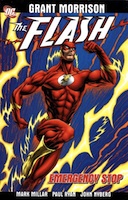 In the real world, the Twelfth Amendment dates back to 1803 (passed 1804) and changes the way the President and Vice-President are elected. Assuming the DCU’s US just has one more Constitutional amendment than we do, their Twelfth would be just about as old, which leads to the question: Why did they need to amend the supreme law of the land to allow masked heroes to testify 130 years before the Golden Age of super-heroes?
In the real world, the Twelfth Amendment dates back to 1803 (passed 1804) and changes the way the President and Vice-President are elected. Assuming the DCU’s US just has one more Constitutional amendment than we do, their Twelfth would be just about as old, which leads to the question: Why did they need to amend the supreme law of the land to allow masked heroes to testify 130 years before the Golden Age of super-heroes?
Thinking about it, though, DC does have super-heroes whose adventures take place in earlier eras, especially in North America. Not just heroes of the Western genre like Jonah Hex or Bat Lash, but classical super-heroes with masks, costumes and powers. Max Mercury’s origin dates back to the early 1800s, for instance, and Miss Liberty (an ancestor of Jesse Quick/Liberty Belle) fought in the American Revolution.
Might the early United States in the DC Universe have decided it was worth letting some of their more colorful national heroes remain pseudonymous even in legal proceedings? It’s certainly possible.
Whatever the circumstances of its passage, it sheds some light on the otherwise nonsensical fact that Barry Allen kept his mask on and his identity secret from his arrest all the way through his trial for manslaughter in the case of Professor Zoom’s death, dissected in great detail by Bob Ingersoll.

*It’s a little more complicated than that, of course.

